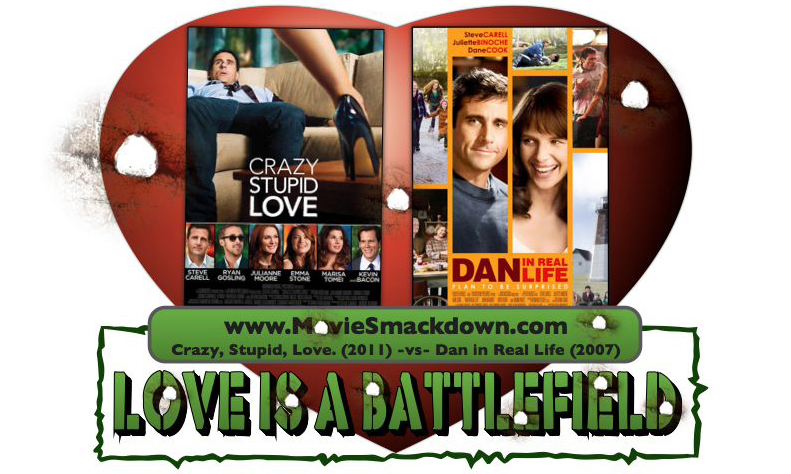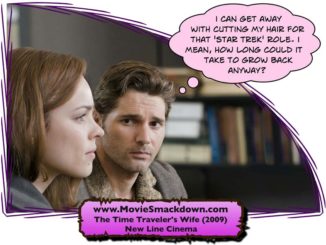
The Smackdown
Is it better to give than receive? Before you answer, the question’s not asking about sex or birthday gifts but relationship advice. Newly liberated Office-mate Steve Carell finds himself on both sides of that equation in our Smackdown between a couple of romantic dramedies, Crazy, Stupid, Love., opening this weekend, and 2007’s Dan in Real Life.
Crazy, Stupid, Love., with its period at the end that causes my auto-correct fits, is probably the most grammatically irritating film title since Precious: Based on the Novel ‘Push’ by Sapphire. Carell portrays boring, straitlaced Cal Weaver, who gets dumped by his wife and taken in as a charity project by Ryan Gosling’s barfly/man/god, Jacob Palmer. In Dan in Real Life, it’s Carell’s Dan Burns dispensing the advice in a newspaper column with the same name as the film, while trying to raise three daughters in various stages of meltdown after the death of their mom and Dan’s wife a few years earlier.
Two depressed guys, two lost wives, two sets of three quirky kids, and two comedies based on a Steve Carell character’s ability to roll with the romantic punches. So it comes down to Cal versus Dan, and it should come as no surprise that no matter who’s giving the advice, love makes a fool of them both.
[singlepic id=1094 w=320 h=240 float=right]
The Challenger
Crazy Stupid Love. isn’t only about the ebb of a longstanding relationship between Cal and Emily, played by a restrained Julianne Moore. It’s also about the flow of hormones in Cal’s 13-year-old son Robbie, who’s crushing on an older woman, namely his 17 year-old babysitter – who in turn harbors a mad infatuation for Cal. There’s also the growing relationship Cal’s oldest daughter Hannah (Emma Stone) finds with advice-meister swinger, Jacob, played with convincing macho madness by the normally not-so-comedic Gosling. Hannah meets Jacob while out with a gal-pal – like dad, like daughter to frequent the same posh bar – even if they don’t know it. Separately, Jacob succumbs to Cal’s nice-guy pity party. Stay with me people, the cross-currents are running at high tide.
Jacob is actually a great character creation, a sort of Professor Higgins to Cal’s Eliza Doolittle. Instead of a cockney accent, though, Cal must overcome the shame of never changing out of tennis shoes, getting Supercuts haircuts and shopping at the Gap. (Makes you wonder if it is a good thing for companies to do product placement in this film.) All this is in service to Cal’s need to win the superficial Emily back after she grows so accustomed to his every-guy suburban face, she demands a divorce.
The Pygmalion aspects to the story are the most fun parts of the movie, with Cal’s reintroduction to women, including a nice turn by Marisa Tomei as a one-night stand, providing the most fruitful ground for comedy. The subplots, on the other hand, tend to stretch credulity. But despite its flaws, Crazy, Stupid, Love. reminds everyone that love makes us all do very crazy, stupid things. And at every age.
[singlepic id=1092 w=320 h=240 float=right]
The Defending Champion
Newspaper advice columnist Dan Burns tries to deal with parenting challenges as they arise. The current bane of his existence is middle daughter, Cara, who declares with the certainty that only a teenager can muster that she has met her soul-mate and fallen in love in just three days. When she is insists on staying near her boyfriend and skipping the family vacation to Dan’s parents’ picturesque Rhode Island home, Dan puts his foot down. She’s going — no ifs, ands or buts, and he’s probably even thinking that age-old dad line, “If you don’t cut it out, I’m pulling over to the side of the road.†He is just that kind of guy.
Once at the shore, Dan’s mother encourages him to go to town a bit and let the vacation begin – at least for his daughters who can catch a breather from his controlling ways. Dan’s idea of letting his hair hang down is to cruise the bookstore, where he meets Marie, played engagingly by Juliette Binoche. Despite initially taking him for a clerk, Marie and Dan have chemistry, and she quickly becomes an oasis in the loveless desert of Dan’s life. Marie seems perfect in every way – and a strong counterpoint to his emphatic statement that there is no such thing as love at first sight. But there’s only one small problem – Marie already has a boyfriend, and he turns out to be Dan’s dim but physically talented brother Mitch, a personal trainer.
Both Dan and Marie try to deny their growing attraction and swallow the gut feeling that this could be a real shot at happily ever after together. Feelings crescendo at a family talent show performance of Pete Townsend’s “Let My Love Open the Door.†Dan’s supposed to be playing backup – until crunch-counter Mitch forgets the lyrics, and Dan sings out for a very special lady in the audience.  Aspiring Lotharios take note: Guitar lessons are so worth it.
The Scorecard
If Steve Carell were any more lovable, he’d have to run for political office just so people could find reasons to hate him. It’s never easy to play someone who is intentionally drawn as boring and not be boring, but Carell pulls it off, making Cal sympathetic for being so pathetic. In Dan Fogelman’s sometimes-poignant script, directed by the team of Glenn Ficarra and John Requa, Cal still mows Emily’s lawn under the cover of darkness – not so much for her as it is to satisfy his own yearning for the life he’s lost. These are nicely realized moments.
Julianne Moore actually has an even greater climb, playing a cheating wife who’s still worth the trouble Cal goes through to get her back, but she manages to project a vulnerability that allows her humanity to shine through.
Dan is not so much a loser as Cal, but he got dealt a tragic hand when he lost his wife and had to fill her shoes raising three young daughters. When his middle daughter calls him a “murderer of love,†it strikes that over-the-top, emotional teen chord much better than when Cal’s son Robbie performs a scene from The Scarlet Letter to impress his babysitter in front of the high school lunch crowd. That just didn’t feel plausible. And there’s that scene at the end of Crazy, Stupid, Love. where Cal has to stand up in front of everyone and tell them what the moral of the story is and what theme of the film is all about just in case no one has figured it out yet.
That’s the chief difference in the films: Dan in Real Life, directed by Peter Hedges from a script by Pierce Gardner and Hedges, goes for a more realistic tone, and Crazy, Stupid, Love. is an occasionally well-observed movie painted in much broader strokes. Neither tone is inherently better, but CSL eventually stumbles under the weight of its preposterousness. The subplots with Robbie-babysitter-Cal and Hannah-Jacob are initially entertaining, but ultimately, the lapse in reality stops the audience’s emotional involvement in its tracks.
The DecisionÂ
There’s much to like in both movies when they honestly depict the struggles people go through to make relationships work – be they between husband and wife, or widower and potential relationship, as the grieving dad tries to get lucky in love for a second time. In both films we see how hard it is to make parent-child relationships work while battling the emptiness that comes with the loss of a partner.
Ultimately, while the laughs are bigger in Crazy, Stupid, Love. and the trailer makes it seem like the next Graduate, Dan in Real Life gets the decision here, because it presents these relationships with truth and is more emotionally satisfying. CSL gets bogged down with too many pre-fab Hollywood storytelling contrivances, and its many subplots end up detracting rather than adding to the main theme.
At the end of Dan in Real Life, Dan narrates a column that gives us all hope that whatever life throws our way, we too can figure it out. And that’s just a better feeling.





Leave a Reply